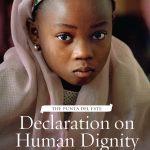 Donlu DeWitt Thayer is a Senior Fellow of the International Center for Law and Religion Studies and Co-Editor of this blog.
Donlu DeWitt Thayer is a Senior Fellow of the International Center for Law and Religion Studies and Co-Editor of this blog.
In December 2018 in Punta del Este, Uruguay, at the easternmost edge of the South American contintent, a conference was convened under the auspices of the European Academy of Religion, with the leadership of Slovak statesman Ján Figel’, Special Envoy for Freedom of Religion or Belief Outside the European Union, and with the support of the International Center for Law and Religion Studies at Brigham Young University Law School in the United States. The event brought together three dozen scholars, jurists, and religious and civic leaders to celebrate the 70th Anniversary of the Universal Declaration of Human Rights (UDHR) by developing “an invitation to a global conversation about preserving and protecting human dignity for everyone everywhere.” Following upon discussions, preparatory events, and draft manuscripts made during 2018, the culminating work of the Punta del Este gathering was a document with universal implications: The Punta del Este Declaration on Human Dignity for Everyone Everywhere.
The concept of Human Dignity is not without controversy. It has been called a “mercurial” concept. Is it in fact a single concept, or several? (See, as one comprehensive treatment of the subject, the discussion of Human Dignity in the Internet Encyclopedia of Philosophy.) The English word descended from the Latin dignus, worthy, can connote “state or quality of being worthy of honor or respect” or “the right of a person to be valued and respected for their own sake, and to be treated ethically” or perhaps a notion of a formal reserve in manner, a state of high esteem, high rank, nobility. The source of the value and nature of the status that dignity implies can be contested. The notion of dignity can be seen as reflecting cultural or philosophical bias. Arguments about the nature of “rights” and even of personhood can be raised. If some see human dignity as inherent even in the unborn, others recoil at this idea, or at the notion of dignity as privilege leading to oppression.
But the drafters of the UDHR, representatives of a variety of legal and cultural backgrounds from all regions of the world, working at a time when the horrors of World War II were fresh upon world memory, found in the notion of dignity, the notion of the worth of each individual human being, a core for their three years of discussions and drafting. The final document was ultimately adopted “without dissent” (though with a few abstentions) by the United Nations General Assembly in Paris on 10 December 1948. The common ground, the “safe space” in which human rights could be defined and protected, so that human beings can flourish, was the notion that “the dignity and the equal and inalienable rights of all members of the human family” are the “foundation of freedom, justice, and peace in the world.” (See the text of UDHR here. This “milestone document” has been translated into more than 500 languages.)
The Punta del Este Declaration, reaffirming the UDHR, is premised upon the notion that “dignity is an essential part of what it means to be human. Respect for human dignity for everyone everywhere helps us define and understand the meaning and scope of all human rights.” With 70 original signatories and now (by September 2019) some 60 more, the Declaration is the foundation of an ongoing Human Dignity Initiative:
 “The long-term aim of this project … is to provide in-depth explanations for a set of dignity-based principles that can help anchor protection of dignity for everyone everywhere. Such principles can be found at the level of foundations, objectives, and criteria for evaluating human rights. But they can also address building common understanding, finding better ways to implement or realize human rights, including finding principles for reconciling or adjudicating human rights claims in plural societies.”
“The long-term aim of this project … is to provide in-depth explanations for a set of dignity-based principles that can help anchor protection of dignity for everyone everywhere. Such principles can be found at the level of foundations, objectives, and criteria for evaluating human rights. But they can also address building common understanding, finding better ways to implement or realize human rights, including finding principles for reconciling or adjudicating human rights claims in plural societies.”
The website of the Initiative tracks events, provides resources, and invites participation.
